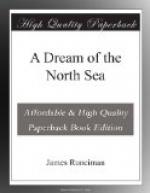Then Marion told him all about the falling spars, the poisoned ulcers, the great festers, the poisoned hands caused by venomous fishes accidentally handled in the dark, wild midnights; the salt-water cracks, the thousand and one physical injuries caused by falls, or the blow of the sea, or the prolonged fighting with heavy gales. The girl had become eloquent; she had seen, and, as she was eloquent as women generally are, she was able to make the keen old man see exactly what she wanted him to see. Then she told how Ferrier stuck to the sinking smack and saved his patient, and Robert Cassall muttered, “That sounds like a man’s doings;” and then with every modesty she spoke of Tom Betts’s mistake. There never was such a fluent, artful, mock-modest, dramatic puss in the world!
“Hah! mistook you for an angel. Eh? Not much mistake when you like to be good, but when you begin picking my pocket, there’s not much of the angel about that, I venture to say.”
So spoke the old gentleman; but the anecdote delighted him so much that for two or three days he snorted “Angel!” in various keys all over the house, until the servants thought he must have turned Atheist or Republican, or something generally contemptuous and sarcastic. The girl had him in her toils, and the fascination was too much for him. She could look grand as a Greek goddess, calm and inscrutably imposing as the Venus of Milo; but she could also play Perdita, and dance with her enslaved ones like a veritable little witch. Robert Cassall was captured—there could not be much error about that. He asked, with a sudden snap of teeth and lips which made his niece start: “And how much do you want to coax out of me, Miss Molly. Give me an idea. Of course I’m to be the uncle in the play, and ‘Bless you, me chee-ill-dren,’ and the rest. Oh yes!”
“Oh, one vessel could be kept up for L30,000.”
“What! Per year?”
“No. The interest on L30,000 in North Western Railway stock would support a vessel well. You could easily support two.”
“This girl’s got bitten by a money-spending tarantula. Why you’d dance a million away in no time. Why, in the name of common sense, why should I support two vessels and their hulking crews—who chew tobacco, of course, don’t they? To be sure, and hitch their slacks! Why should I support all these manly tars!”
“Now! I’ll be angry. I’ll tell you why. You know you have more money than you can ever spend. You promise me some, and you’re very good, but I’d almost rather live on my own than have too much. Well, I can’t bear to think of your dying—but you must die, my own good dear, and you will have to divide your money before you go. There will be a lot of heart-burning, and I’m afraid poor me won’t come off very lightly if I am left behind you. You will want a memorial.”
“You remember me and do as I would like you to do, and we sha’n’t trouble our minds much about memorials. I thought of almshouses, though.”




